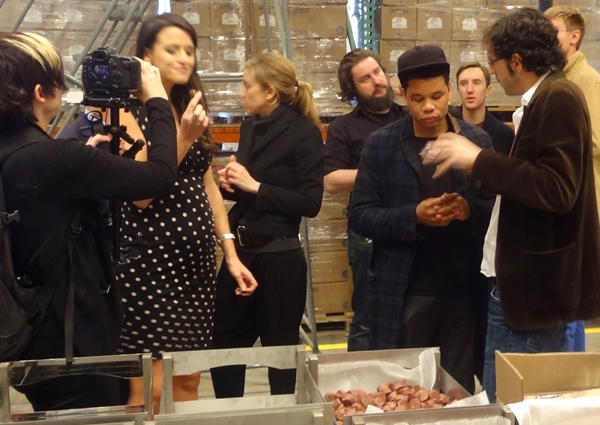
Photo: Benjamin Sutton.
Here at artnet News, we are still scratching our heads over the timing of Carl Swanson’s extremely lengthy profile of art market darling Oscar Murillo and the perils of his recent success in New York magazine, coming as it does at the end of David Zwirner‘s much-hyped show “A Mercantile Novel,” which wrapped two weeks ago. The exhibition, which drew widely varying reactions, involved the setup of a satellite Colombina chocolate factory inside the Chelsea mega-gallery (many of Murillo’s relatives have worked at the original one in Colombia).
In the profile there’s some strange sulking about the often less-than-glowing media coverage. Zwirner describes it as “a pattern in the local press where they’re very hard on young artists who don’t live here, who come from other places.” To which we say, “Ummm…What?” But what really stands out is the amount of real estate the piece allots to Miami mega-collectors Donald and Mera Rubell, including extensive comments and debates about nearly all aspects of Murillo’s oeuvre. The Rubells, who arguably “discovered” Murillo but have unarguably played a huge role in his recent success, describe their interest in his art, their direct support of his career, and debate the importance of the fact that he is an “immigrant.” They frequently say things that make absolutely no sense to us whatsoever but leave us mildly intrigued… we think.
Here are some standout Rubell head-scratchers from the story:
1. Mera says: “People are always trying to figure out the power of the immigrant…The power of the immigrant is that they always show up. You don’t always know if you can deliver but you always show up. Oscar always shows up. We give him 24-hour access to the space, and every day we get these updates: Look what he did last night, look at what he did this morning. Look, look, look.” (The Rubells let Murillo use one of the galleries in their foundation, a former DEA facility in Miami adjacent to their home, for the summer of 2012.)
2. Talk about running in different social circles! Mera recounts: “It happens we’re friends with some Colombians in Miami. We tell them we met this Colombian artist who now lives in London, who’s from this small town where his family cuts sugarcane with machetes. And not only do they know the town, but this person that we know—his uncle owns the factory.”
3. For reasons we absolutely cannot fathom, the Rubells decided it would be good idea to set up a meeting in their living room between the artist and the factory owner, one César Caicedo. According to Donald: “They’re our best friends in Miami. And it was fascinating … And the first thing they said was, ‘Oscar doesn’t have an upper-class accent.’ ” Artist and factory-owner “both assumed the traditional roles that they had in this town. There was a lot of tension.”
“Not tension,” says Mera. “He was returning to the core of his identity.” Sure…
4. In one of several spots where Swanson compares Colombian-born Murillo to Jean-Michel Basquiat: “Like Basquiat, Murillo is black, ambitious, and engaged with both art history and graffiti…Until recently he even shared a hairstyle with the late artist.” Mera Rubell adds this distinction: “Or at least the movie version of Basquiat.” Huh?
5. Mera says: “We have not had a sit-down with David Zwirner about Oscar. And it bugs the shit out of me. You’d think he would call us up and say, ‘Who is Oscar?’ We know him so well.”
6. The Rubells had not heard of Murillo when they first encountered his work at the Independent art fair in 2012, where London dealer Stuart Shave was displaying it. All the paintings were already sold, recounts Mera: “Stuart said: ‘I wish I knew you were interested.’ We said, ‘How could we know we were interested?’ We’d never heard of this artist. We thought, We need to meet this young artist because—”
“It’s not just who he is; it’s who he can become,” says Donald.